SCOTUS Atrocities, 2022 Edition
Tagged:Politics
/
R
/
Religion
/
Sadness
The Supreme Court of the United States (SCOTUS) has a 6-3 conservative majority. Have the cases and decisions become any different as a result?
A general sense of foreboding
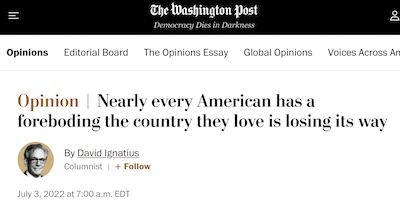 David Ignatius writes at the WaPo on the general sense of foreboding many Americans now
have [1]:
David Ignatius writes at the WaPo on the general sense of foreboding many Americans now
have [1]:
What does our national portrait look like on this Independence Day? Many of us see an angry, traumatized face, rather than the radiant glow of the Founders. That’s the odd thing about this hyperpartisan moment: Nearly every American, whatever their political perspective, has a foreboding that the country they love is losing its way.
Now, I understand why liberals and independents are traumatized: we’re watching knucklehead theocrats drag the country back into the pre-Enlightenment mud. But why are the conservatives traumatized, when they’re getting all the destruction for which they’ve lusted, these many years?
And it’s not just a government problem, it’s also in the private sector, education, and healthcare:
It isn’t just a government problem, though. Private-sector productivity has been stagnant for decades, and corporations struggle with bureaucracy and bloat. Universities spend nearly as much on administration as teaching, and administrative costs account for a third of total health-care spending.
Ask any private sector employee about management bloat with all the MBAs. Ask any professor about the crushing burden of yet more administrators. Ask any doctor about paperwork and reporting in general.
Ignatius concludes:
Some people get so angry they want to burn the house down and start over.
We’re not at that cataclysmic point yet. I see positive signs in the slow but growing Republican willingness to challenge Donald Trump, and in the broad, bipartisan anger at the extremism of recent Supreme Court decisions. But bad things can happen to good countries, as our modern history shows.
Still… I thought conservatives were getting their chance to “burn the house down”, to use Ignatius’s phrase. Don’t flames make nihilists happy with their arson? Are they so delusional they still think they’re victims? Is the prospect of Democrats having even a sliver of power, not even enough to govern as is the case now, so threatening?
How partisan is SCOTUS, historically speaking?
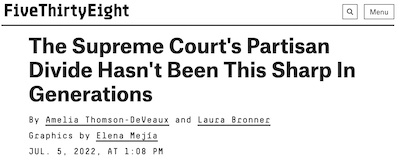 Thomson-DeVeaux & Bronner write at 538 that the SCOTUS is now more divided politically
than it’s been in generations [2], thanks to 50 years of
effort by Republicans to pack the court with extremists.
Thomson-DeVeaux & Bronner write at 538 that the SCOTUS is now more divided politically
than it’s been in generations [2], thanks to 50 years of
effort by Republicans to pack the court with extremists.
Their analysis is pretty clear:
The conservatives answered by delivering the most far-reaching slew of rulings in modern memory. It’s now abundantly clear that Trump’s appointees are in control of this court, and they’re not searching for consensus. In fact, the divide between the court’s Republican and Democratic appointees is deeper than it’s been in the modern era.
(Keep in mind that “modern era” means “since the American Civil War”, so don’t take a great deal of comfort from Republicans stopping just short of violent insurrection and civil war.)
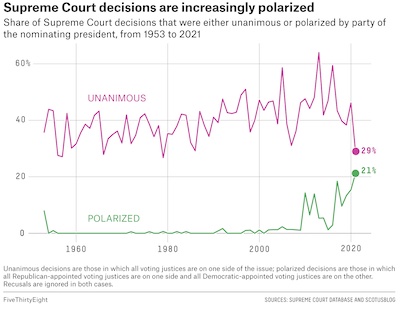 Cold, hard data support this: Thomson-DeVeaux & Bronner point out that historically,
about half of SCOTUS decisions are unanimous, and those exactly along partisan blocs are
rarer. No longer, as shown in this plot of the % decisions unanimous and partisan bloc
over time since 1953. This is clearly a SCOTUS in a pathological state.
Cold, hard data support this: Thomson-DeVeaux & Bronner point out that historically,
about half of SCOTUS decisions are unanimous, and those exactly along partisan blocs are
rarer. No longer, as shown in this plot of the % decisions unanimous and partisan bloc
over time since 1953. This is clearly a SCOTUS in a pathological state.
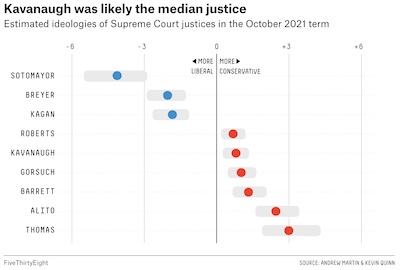 And it’s not just the group behavior that’s lurched far right, either. Individual
justices can be rated ideologically by a bit of math called the
Martin-Quinn score.
And it’s not just the group behavior that’s lurched far right, either. Individual
justices can be rated ideologically by a bit of math called the
Martin-Quinn score.
(NB: Back in 2003, shortly after they published their paper using Markov Chain Monte Carlo regression [3], I had some brief correspondence with Kevin Quinn about the MCMCpack package in R. I was doing something similar in genomics at the time. He came off as quite competent, collegial, and affable to me. If you think that biases my opinion in Martin & Quinn’s favor, feel free to think that.)
As you can see here, Kavanaugh is likely to be the median justice now, despicable as he may be. The Supremes are just that highly right-wing biased nowadays!
In fact, about half of the ideologically polarized opinions were written by 2 of the court’s most extreme right-wingers: Alito (21%) and Thomas (29%). That’s the polluted far-right source of new nudges to our law.
Do the SCOTUS decisions hit home personally?
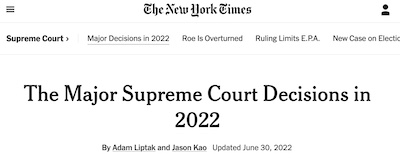 Ok, but does that resonate personally: do I as a progressive liberal feel that way, when
confronted with a list of this term’s SCOTUS decisions? To find out, we peruse the
helpful list of major decisions this term by Liptak & Kao at the
NYT. [4] Let’s go over them and register a personal
reaction to each one negative, neutral, good: AARGH/MEH/YAY.
Ok, but does that resonate personally: do I as a progressive liberal feel that way, when
confronted with a list of this term’s SCOTUS decisions? To find out, we peruse the
helpful list of major decisions this term by Liptak & Kao at the
NYT. [4] Let’s go over them and register a personal
reaction to each one negative, neutral, good: AARGH/MEH/YAY.
- Climate change: W Va v EPA. The court gutted regulatory agency ability to regulate much of anything, in particular broad regulations over the energy sector. They now require Congress to weigh in on all the minutiae, specifying every single regulation and level of pollutant, which will of course never happen. Solid AARGH. Conservative bloc decision.
- Immigration: Biden v Texas. Allows Biden administration to end Trump-era rules called “remain in Mexico”. Marginal YAY. Split decision.
- Native Americans: Oklahoma v Castro-Huerta. Much of Oklahoma is a Native American reservation, and much law enforcement is tribal. The Court allows state authorities to prosecute crimes committed by non-Native Americans committing crimes against Native Americans there, creating a conflict with tribal enforcement. Honestly, I dunno here: I’m in favor of tribal independence, but don’t understand the issue. So, MEH. Split decision, because of Gorsuch.
- School prayer: Kennedy v Bremerton Sch Distr. A more than usually knuckleheaded high school football coach wanted to pray in the middle of the football field after games. He wished to do so in public. He also wished to invite players “who wanted to join” to do so. This was in spite of their being his subordinates utterly dependent on him, which impairs their ability to consent. The court inexplicably thinks this is ok, in spite of the obviously coercive element of the coach using his public employment to encourage a particular religion. Solid AARGH. Conservative bloc decision.
- Abortion rights: Dobbs vs Jackson Women’s Health Organization. Need we say more than that the court wishes, essentially for religious and right-wing policy preference reasons, to remove a basic civil right enshrined in American law for almost half a century? Solid, gold-plated AARGH! Conservative bloc decision.
- Guns: NY State Rifle & Pistol Assn v Bruen. New York required people to show a good reason for a public concealed carry permit for guns. The Supremes say basically no, everybody can have guns everywhere. This is as stupid as it is evil. Absolutely rock-solid AARGH. Conservative bloc decision.
- Church/State separation: Carson v Makin. Supremes rule that a Maine state tuition program must also pay tuition to religious schools. I mean, c’mon, this isn’t even hard: the answer is no. Still, the court ruled in favor. Solid AARGH. Conservative bloc decision.
- 1st Amendment and public fora: Shurtleff v Boston: Groups periodically ask Boston to fly their flag at City Hall, just for the good feels. The city refused a flag from a Christian group, though it allowed other causes. The court says they have to do it, in the name of even-handedness. I’ll give it a marginal YAY, since this seems fair (though I wonder what would happen if a neo-Nazi group tried this). Unanimous decision.
- 1st Amendement and censures: Houston Comm Coll Sys v Wilson. The court rules elected bodies are on solid ground when they choose to censure a member. Seems solid. Conditional YAY. Unanimous decision.
- Religion & death penalty: Ramirez v Collier. Prisons are not allowed to deprive prisoners being executed from contact with clergy, even being touched. Again, seems pretty good. Solid YAY. (Though… can we just abolish the stupid death penalty? Then the cruelty here just goes away.) Split decision, because Thomas was the lone dissenter who wanted prisoners to die without contact with clergy.
- State secrets: US v Zubaydah. Zubaydah was tortured, but the US is not required to say exactly where that happened. Eh… once you start torturing people, in my mind that’s a crime and you don’t get to conceal anything. Security is useful, but I’m giving this a marginal AARGH. Split decision.
- Executive privilege: Trump v Thompson. Former “president” Trump does not any longer have executive privilege to block release of documents to the J6 committee. Absolutely right. Solid YAY. Split decision, because Thomas wants Trump to have power forever.
- Workplaces and COVID-19: Natl Fed of Indep Bus v. Labor Dept. Supremes reject Biden’s mandate of vaccination or testing at large employers. Absolutely, suicidally stupid. Big, honkin’ loud AARGH. Conservative bloc decision.
- Healthcare facilities and COVID-19: Biden v Missouri. Upholds Biden mandate that healthcare facilities receiving federal money must not be stupid, and thus should vaccinate workers. Solid YAY, though puzzling why this one differed from the previous. Employers are somehow allowed to subject workers and customers to risk of death?! Split decision.
So out of 14 cases important enough to be summarized by the Times, we got:
- YAY: 6
- MEH: 1
- AARGH: 7
If I give them the benefit of the doubt on the Native American thing (where I’m just ignorant), then it’s about 50% evil and stupid decisions.
That’s… breathtaking. Especially so when we consider the degree to which these bad decisions were almost all the result of the conservative bloc taking away fundamental rights.
But: is my concern here just the general result of the cases, or is it specifically due to the conservative bloc votes?
We can look at that too, with a crosstabulation of YAY/MEH/AARGH assessments with whether the case was conservative bloc, split decision, or unanimous. (There can be no liberal bloc, since they’re a decided minority.) That leads to the following 3x3 crosstabulation and Fisher exact test in R:
> df <- data.frame(CaseNum = 1:14, Case = c("W Va v EPA", "Biden v Texas", "Oklahoma v Castro-Huerta", "Kennedy v Bremerton Sch Distr", "Dobbs vs Jackson Women's Hlth Org", "NY State Rifle & Pistol Assn v Bruen", "Carson v Makin", "Shurtleff v Boston", "Houston Comm Coll Sys v Wilson", "Ramirez v Collier", "US v Zubaydah", "Trump v Thompson", "Natl Fed of Indep Bus v. Labor Dept", "Biden v Missouri"), Assessment = c("AARGH", "YAY", "MEH", "AARGH", "AARGH", "AARGH", "AARGH", "YAY", "YAY", "YAY", "AARGH", "YAY", "AARGH", "YAY"), DecisionType = c("ConservativeBloc", "Split", "Split", "ConservativeBloc", "ConservativeBloc", "ConservativeBloc", "ConservativeBloc", "Unanimous", "Unanimous", "Split", "Split", "Split", "ConservativeBloc", "Split"), stringsAsFactors = TRUE); df
CaseNum Case Assessment DecisionType
1 1 W Va v EPA AARGH ConservativeBloc
2 2 Biden v Texas YAY Split
3 3 Oklahoma v Castro-Huerta MEH Split
4 4 Kennedy v Bremerton Sch Distr AARGH ConservativeBloc
5 5 Dobbs vs Jackson Women's Hlth Org AARGH ConservativeBloc
6 6 NY State Rifle & Pistol Assn v Bruen AARGH ConservativeBloc
7 7 Carson v Makin AARGH ConservativeBloc
8 8 Shurtleff v Boston YAY Unanimous
9 9 Houston Comm Coll Sys v Wilson YAY Unanimous
10 10 Ramirez v Collier YAY Split
11 11 US v Zubaydah AARGH Split
12 12 Trump v Thompson YAY Split
13 13 Natl Fed of Indep Bus v. Labor Dept AARGH ConservativeBloc
14 14 Biden v Missouri YAY Split
> tbl <- table(df$"Assessment", df$"DecisionType"); tbl
ConservativeBloc Split Unanimous
AARGH 6 1 0
MEH 0 1 0
YAY 0 4 2
> fisher.test(tbl)
Fisher's Exact Test for Count Data
data: tbl
p-value = 0.005162
alternative hypothesis: two.sided
- The first output is just a table of the above data, giving the case, my feelings about it, and whether it was a bloc/split/unanimous decision.
- The second output is the crosstabulation, giving the count of cases with the given
assessment by me on the rows and the decision type on the column.
- As you can see, almost all my “AARGH” problems are due to conservative bloc decisions.
- The single exception was US v Zubaydah, where it really was kind of split in a way I just don’t understand.
- Finally, we performed a Fisher exact test: the null hypothesis is that my feelings are unrelated to the bloc/not-bloc nature of the decision; the alternative hypothesis is that the are related. The verdict, with a $p$-value of $p \sim 0.5\%$, is that they are in fact related.
So, yeah: I’m steamed about those Team Evil bloc votes. (You can, of course, argue that this result is more about me than about any objective merits of policy. That’s fine; at least I know what I’m mad about and I’m consistent about that anger.)
Time to eliminate the filibuster, expand the court, and maybe impeach a few of the more problematic justices. Thomas, with his compromised ethical position comes to mind: why should he sit on the court when his wife is an activist in the matters before him?
The Weekend Conclusion
 Esteemed med-chem blogger Derek Lowe weighed in on the July 4th weekend about our
increasingly tribal identities in the US. [5] (Plus, extra
special bonus points for recognizing and applying
Russel’s paradox to the problem!)
Esteemed med-chem blogger Derek Lowe weighed in on the July 4th weekend about our
increasingly tribal identities in the US. [5] (Plus, extra
special bonus points for recognizing and applying
Russel’s paradox to the problem!)
He describes his tribal identity at first humorously, and then:
I’m white, I’m male, I just reached the 60-and-over demographic, I used to often vote Republican but don’t see how I can ever do that again, I don’t think that the last election was stolen. And so on. That’s where the arguing starts.
(Yeah, I grew up Republican, too. But it’s possible to get over that and get better. I promise, life gets better afterward.)
His description of his attitude to life is almost exactly a description of the purpose of this Crummy Little Blog That Nobody Reads:
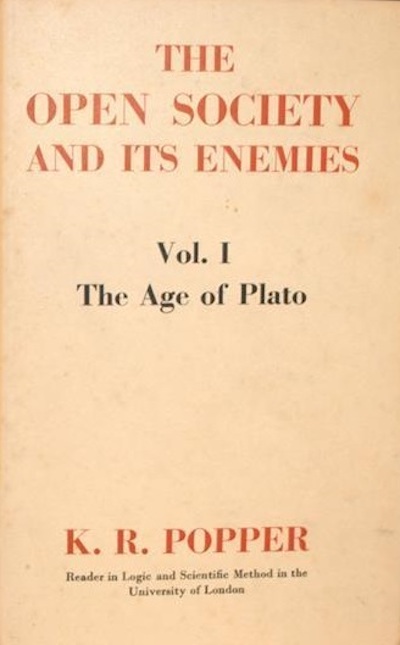
My reflex is to try to argue from evidence, which can be kind of annoying to people around me, because forty years or so of studying and practicing in science has made me deal with most every new thing that comes up by first saying to myself “Hmm. I wonder if that’s true?” and then deciding how much weight to give it (or how much time to invest in deciding that!)
Yes, we have a sense of foreboding, because the conservatives are spreading fascism, or in Lowe’s words, “poisonous garbage”. We must, following Karl Popper’s terminology from the Open Society [6], be intolerant of intolerance.
Notes & References
1: D Ignatius, “Nearly every American has a foreboding the country they love is losing its way”, Washington Post, 2022-Jul-03. ↩
2: A Thomson-DeVeaux & L Bronner, “The Supreme Court’s Partisan Divide Hasn’t Been This Sharp In Generations”, Five Thirty Eight, 2022-Jul-05. ↩
3: AD Martin & KM Quinn, “Dynamic Ideal Point Estimation via Markov Chain Monte Carlo for the U.S. Supreme Court, 1953–1999”, Political Analysis 10:2, 134–153, 2002. DOI: 10.1093/pan/10.2.134. ISSN 1047-1987.↩
4: A Liptak & J Kao, “The Major Supreme Court Decisions in 2022”, New York Times, 2022-Jun-30. ↩
5: D Lowe, “Various Tribes”, In the Pipeline blog at Science Translational Medicine, 2022-Jul-05. ↩
6: K Popper, “The Open Society and Its Enemies”, Routledge, 1945. ISBN: 978-0-691-15813-6. ↩
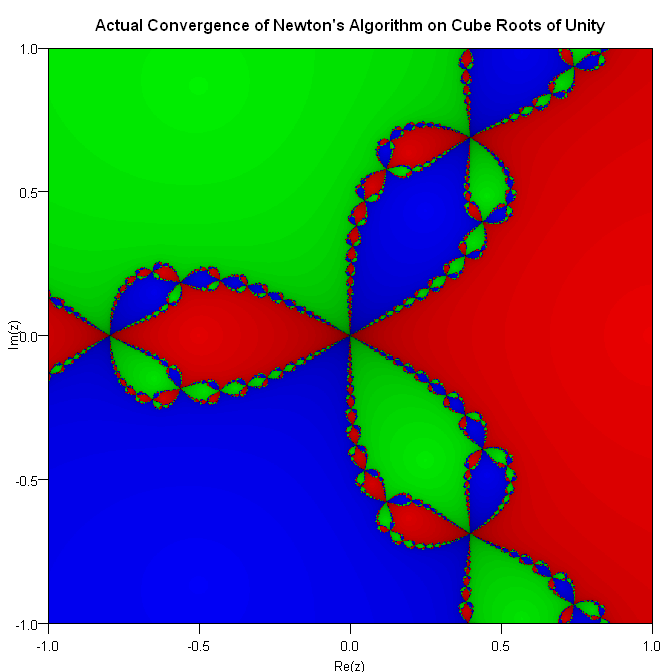
Gestae Commentaria
Comments for this post are closed pending repair of the comment system, but the Email/Twitter/Mastodon icons at page-top always work.